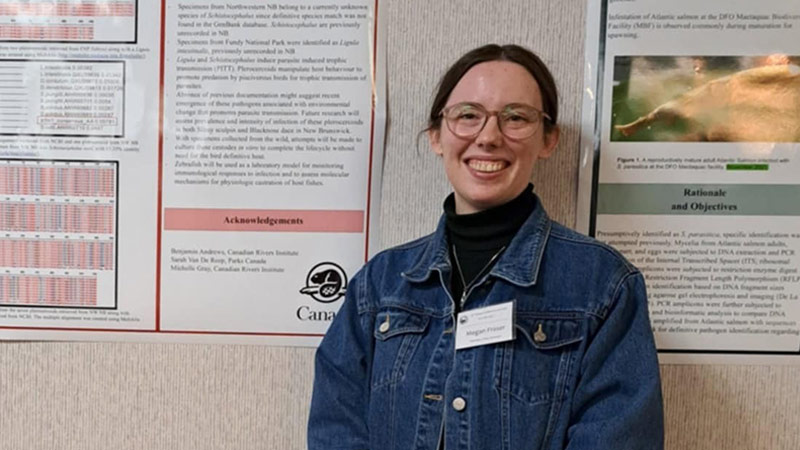From Facebook post to PhD: UNB student spreading awareness of fish-infecting tapeworm
Author: Dria McKenna
Posted on Aug 12, 2024
Category: Faculty of Science , Research , UNB Fredericton

After Megan Fraser made a post on social media about a fish-infecting tapeworm that she had recently identified, she turned off her phone and went to bed. She expected no more than a few of her mom’s friends to read it.
The next morning, she woke up to thousands of notifications.
“I had made a post on Facebook saying, ‘Hey, if anybody finds this weird worm when they're out fishing, let me know,'” said Fraser. “Over the next couple of days, it just skyrocketed. I think it has over 2,500 shares now.”
After her post blew up, Fraser was featured in several news outlets and podcasts, where she continued to spread information about the parasitic worm to the public.
She was recognized for her efforts to increase awareness of the tapeworm this past December, when she won the 2024 Public Awareness Award from the Canadian Society of Zoologists.
The award commended Fraser for her well-received public outreach attempt, which began with a simple social media post that spiraled into a widespread educational movement overnight.
Fraser had suddenly found herself at the forefront of helminthological research in New Brunswick – a field she never had imagined entering until a discussion with her academic advisor a few months earlier.
“I was in the final year of my undergrad at UNB, and I didn't know what to do after. I met with my advisor, Mike, and he was like, ‘Well, I have some ideas for different projects if you want to do a senior research project during your last semester,’ and so I did.”
Mike Duffy, an associate professor of biology at the University of New Brunswick (UNB), had recently received a sample of tapeworms collected during a brook trout monitoring project in southern New Brunswick.
“He asked me if I wanted to figure out what the samples were, so I said, ‘Sure, why not?’” said Fraser. “After we did a little bit of digging on them, we found out that the species had never been identified in New Brunswick before.”
Fraser began to focus her senior research project on the species of tapeworm, formally known as Ligula intestinalis.
“I had always liked weird stuff like this, but parasitology wasn't something that I was ever planning on going into,” said Fraser. “I just happened to stumble upon this project, and I really love it.”
After graduating with an honours degree in biology, Fraser turned her research on Ligula into a master’s degree project. It was during the first year of her M.Sc. that she made the post on Facebook, which included an informational poster on the species that encouraged local fishers to keep an eye out for the parasitic worms.
Fraser is now heading into the second year of her PhD and is continuing her Ligula studies with the Duffy and McLellan labs on UNB’s Fredericton campus.
Her research focuses on the tapeworm’s ability to parasitically castrate the infected fish, causing their gonads to be stuck in the primary stage of development.
Fraser hopes that the mechanism behind the tapeworm’s castration ability can be used to advance aquaculture technology.
“In aquaculture, they want to sterilize the stock fish because they don’t want them to sexually mature,” she said. “They don't want the fish to waste energy developing sexual structures or characteristics because these structures are not edible biomass.”
Fraser said that stock fish sterilization also prevents interbreeding between farmed fish and wild fish, which is important for protecting the endangered wild Atlantic salmon population.
“The bigger picture of my research is that if I can identify a compound behind Ligula intestinalis’ castration mechanism, that information could be used to develop technology for fish sterilization in the aquaculture industry.”
As Fraser reflects on all that she’s accomplished throughout her research journey, she is overcome by the amount of support that she’s received. As she looks ahead, she is eager to further contribute to an understudied field alongside her fellow researchers at the Duffy and McLellan labs.
“This is an area of biology that nobody really knows a whole lot about,” said Fraser.
“It’s been so nice to spread information about parasitology to the general public, and to be making a positive impact on the field is really important to me."
